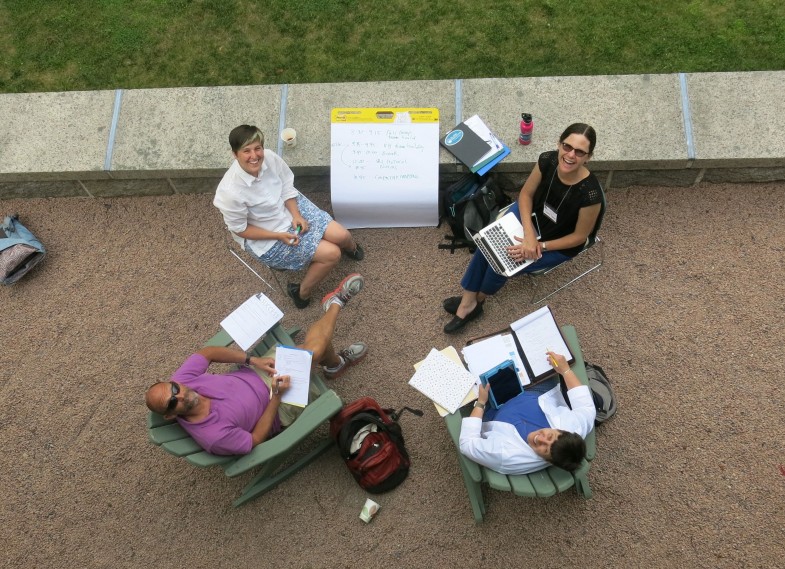
Differentiation. It's a word often used in education to describe teaching the same thing in different ways based on the needs of the learners in a given group. Teachers in Maine's small island and coastal schools have always differentiated; it's an absolute necessity when you only have a handful of students and they are all at different academic levels. The facilitators of the recent SUCCESS Summer Institute believe it is a necessity that professional development for teachers be differentiated as well.
In mid-July, 22 educators from 13 schools and organizations gathered at College of the Atlantic for an intensive three-day workshop focused on experiential and place-based learning. This is an educational approach that emphasizes hands-on learning that is connected to the real world, usually through work with the community or environment. Like the students that these teachers work with, we had to design professional development for educators with a variety of experience. The range of teacher expertise went from was none to extensive, and there is also a wide degree of school capacity to support experiential and place-based learning.
SUCCESS (SUstainable Coastal Communities, Educators, Students and Schools) is a three-year collaboration between the education programs at the College of the Atlantic and the Island Institute, supported by the Fund for Maine Islands. SUCCESS promotes experiential and place-based learning in island and coastal schools through offering a range of professional development experiences for teachers.

We know that teachers need and deserve time to relax and rejuvenate after the long school year, so we held the workshop on the beautiful campus of College of the Atlantic and included time for a boat ride on Frenchman's Bay, as well as time to explore the area and socialize!

Mary Cowhey gives the keynote address
We also know that teachers love to hear from and be inspired by other teachers, so we invited Mary Cowhey, an elementary teacher and award-winning author from Massachusetts to be our keynote speaker. She shared the work that she's done — ranging from running the school garden (including chickens) with her second grade class to social justice work with immigrant parents through a group called Parents of Power.

Building on what we learned from the 2016 Summer Institute, we also continued our quest to provide participants with the most useful and relevant training we could by teaming up with Rural Aspirations Project again this year. Work sessions were structured to allow teachers to move in and out of three different strands based on what their needs and goals were. In "Explore," teachers have the opportunity to be students in the field and experience hands on learning for themselves. "Envision" took participants through the whole process of planning, implementing, and assessing place and project-based learning units. And in "Design," participants worked on creating their own lessons and units for the coming school year.

Let's zoom in on one school team who spent most, but not all of the time, in the Envision strand. This team worked on plans to create school-wide systems and balance their numerous initiatives, while still focusing on student engagement through experiential and place-based leaning. Using a technique called "Empathy Mapping," they gained a deeper understanding of the needs of the school and developed ambitious and informed goals for the coming school year. During one session, some team members attended a session in Design, where they were able to work on specific grade-level units. In another session, a team member joined the Explore group's visit to Pemetic Elementary School and learned about experiential education at the middle school level.
Like this team, everyone at the Summer Institute was given choices and guidance about how to best to meet their goals for their time there. Some people started in one group and then realized that their needs would be better met in a different group. Some tried all three options, while others stayed in one strand for the entire time. It was a little confusing at times, and the facilitators had to be prepared to adjust and adapt on the spot. Messy, but responsive and engaging — that's a good education! In the end, the dominant feedback from the group was very positive — they got what they needed. Sounds like successful differentiation to me!

Contributed by